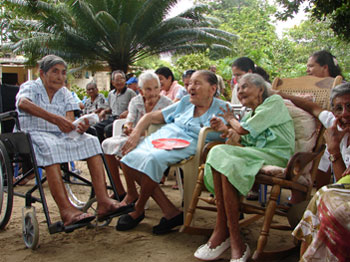Research Areas
Disability, daily activities, and quality of life for older adults

Older adults often place a high priority not only on extending lifespan but maximizing the quality of life in the years they have remaining. Yet, aging and the medical and social infirmities that often come with it can have major negative impacts on quality of life. Among these, disability and the loss of ability to do daily activities without help are of paramount importance. It is essential to find ways of stopping or delaying the onset of these declines. However, not all disability and functional decline is preventable, and it is essential to understand and develop strategies to help people with who have these impairments maximize their quality of life and ability to function. Our researchers are conducting seminal work in these areas:
- UCSF’s Pepper Center for Aging Research, led by Division faculty Ken Covinsky, MD, MPH and Michael Steinman, MD supports a wide variety of projects and up-and-coming researchers focused on the prevention of disability and on optimizing health care and quality of life for people experiencing disability.
- Our investigators are nation-leading experts in using data from national studies to understand the needs of older persons with impairments in daily functioning.
- We are at the forefront of research on understanding how functional decline and disability can help predict how long people have left to live, and in developing tools and resources to help clinicians and patients use this information to optimize health care decisions.
- We conduct leading research to understand and remedy the impact of loneliness on quality of life and health outcomes among older adults.
- Our investigators are exploring music as a means for improving quality of life for older adults with cognitive decline.
- Led by biostatistician W. John Boscardin, PhD, our team is developing novel research methods that offer investigators around the world better tools to study these important topics.
Care for older adults nearing the end of life
In the final years, months, and weeks of life, health care is often misaligned with older adults’ goals and fails to account for the medical, functional, and social circumstances of their lives. Our researchers are exploring how we can improve care at this critical time, and how to take the learnings from scientific studies and effectively implement them in routine clinical practice. Some examples of our work in this area includes:
- Research focused on improving the process of advance care planning, helping people articulate what is important to them and using that information to direct the types of treatments and services that can help them achieve their goals.
- Research that understands and seeks to remedy the harms of overtreating chronic diseases in older adults with limited life expectancy, including diabetes, cancer screening, and many other conditions.
- Research projects and grants that aim to help older adults and their clinicians understand and use information on prognosis, including the likelihood of being hospitalized, moving to a nursing home, or dying in the next 1, 5, or 10 years.
- Research to improve patient-physician communication and address troublesome symptoms among older adults at the end of life.
- Research to improve policies and care delivery for older adults living with, dying from, and grieving dementia and other serious illnesses.
Improving care for older adults with common conditions of aging
Our researchers are at the forefront of research on key issues affecting older adults, including circumstances common to many older adults as well as groundbreaking work that addresses the needs of special high-risk groups.
- The Division co-leads a major NIH grant which supports multiple projects on improving care for people with dementia, and also leads a multi-million dollar program to improve screening and identification of dementia among older adults in California.
- Division research faculty are conducting cutting-edge research to understand and improve medication use in older adults, including reducing overuse of medications whose harms outweigh their benefits.
- The US Deprescribing Research Network, a national research network co-led by Division faculty member Mike Steinman, MD is supporting hundreds of investigators nationally and worldwide to advance research on improving medication use in older adults.
- Division researchers are leading studies to improve the care of older adults undergoing surgery, and addressing the care of older prisoners and other older adults in the criminal justice system through research and policy change.
- Division researcher John Newman is conducting translational research on how ketone bodies, small molecules that our bodies make for energy when we fast or exercise, can be targeted for therapies to delay cognitive decline and improve resilience in older adults.
